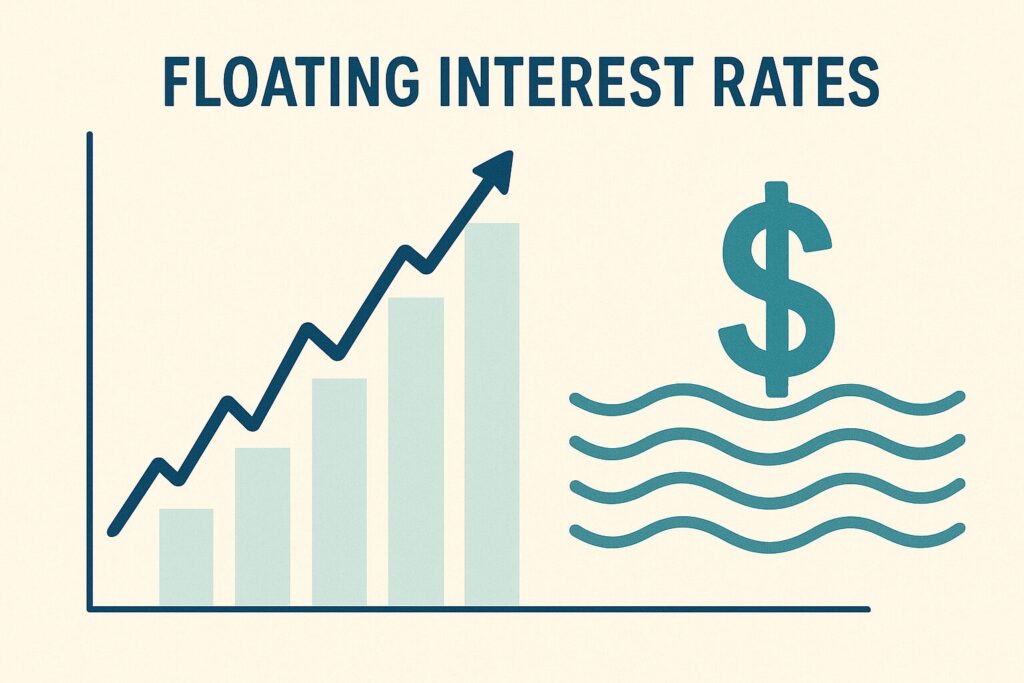
Why retirees love the adjustable nature of senior loan payouts
For retirees who depend on steady income, rising interest rates can be a mixed blessing. Traditional bond prices often fall when rates go up, reducing the value of your fixed-income investments. But there’s one income category that actually benefits from rising rates: floating-rate loans—also known as senior loans.
These unique investments have become a favorite for retirees who want higher yields, monthly income, and protection from inflation and rate hikes. Let’s explore why floating-rate income makes sense—especially in uncertain rate environments.
What Are Floating-Rate or Senior Loans?
Senior loans are issued by banks or lenders to corporations, usually those with below-investment-grade credit, and are often used for business expansion, refinancing, or acquisitions. What makes them different from bonds is their floating-rate structure.
The interest rate on these loans adjusts—usually every 30 to 90 days—based on a benchmark like SOFR (or previously, LIBOR), plus a fixed credit spread. So when interest rates rise, so do the payments to investors.
In short: you get paid more as interest rates go up.
Why Retirees Like Floating-Rate Income
Here are a few reasons senior loans appeal to income-focused investors:
- Inflation hedge – Since payouts rise with rates, they help protect your purchasing power.
- Low interest rate sensitivity – Unlike traditional bonds, floating-rate loans don’t lose as much value when interest rates climb.
- Steady income – Most senior loan funds pay monthly, offering retirees consistent cash flow.
- Position in the capital stack – These loans are typically senior secured, meaning they’re backed by collateral and have priority over bonds and equity in case of default.
How to Invest in Floating-Rate Loans
There are three common ways for retirees to access this asset class:
1. Senior Loan Closed-End Funds (CEFs)
CEFs that invest in senior loans often yield 8% or more and pay monthly income. Top examples include:
- AFT (Apollo Senior Floating Rate Fund)
- BGT (BlackRock Floating Rate Income Trust)
- MFIC (MidCap Financial Investment Corp.) – a business development company (BDC) that focuses on senior secured loans.
These funds are actively managed and often trade at discounts, giving you the chance to boost your yield even further.
2. Senior Loan ETFs
ETFs like SRLN (SPDR Blackstone Senior Loan ETF) and BKLN (Invesco Senior Loan ETF) offer broader access but typically yield less than CEFs and do not use leverage.
3. Floating-Rate Mutual Funds
For investors who prefer mutual funds, there are many actively managed options with lower volatility, but they may require larger minimum investments and have lower yields.
What Are the Risks?
While floating-rate loans are attractive, they’re not risk-free:
- Credit risk – These loans are made to non-investment-grade borrowers. If the borrower defaults, income may stop and principal may be at risk.
- Liquidity risk – Senior loans aren’t as easily traded as stocks or government bonds, which can matter during a market panic.
- Leverage risk in CEFs – Closed-end funds often use borrowed money to boost yields, which can increase volatility in tough markets.
That’s why it’s best to balance senior loans with safer assets like Treasuries or investment-grade bonds.
Final Thoughts
Floating-rate senior loans can be a valuable tool for retirees seeking protection from rising interest rates while still earning attractive monthly income. Their adjustable payouts offer a rare combination: strong income potential with a built-in hedge against inflation and Fed rate hikes.
Used in moderation—and paired with other diversified income investments—they can be a smart addition to your retirement portfolio.
This post is adapted from my book: The 8% Solution: Double Your Retirement Income With High-Yield Closed-End Funds, available now at Amazon.com in paperback and eBook formats.
Disclaimer: This article is for informational purposes only and does not constitute investment advice. All investments involve risk, including the potential loss of principal. Senior loans may be subject to credit, interest rate, and liquidity risks. Always consult with a licensed financial advisor before making investment decisions.